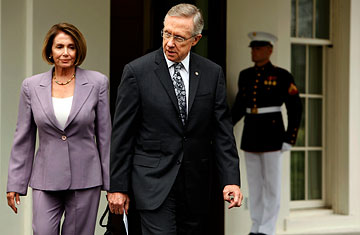
House Speaker Nancy Pelosi and Senate majority leader Harry Reid walk out of the West Wing after meeting with President Barack Obama and Vice President Joe Biden at the White House, Sept. 8
With the passage of health-care-reform legislation out of the Senate Finance Committee expected this week, the debate moves into a new and delicate stage. It is one that will test the legislative and political skills of Senate majority leader Harry Reid and House Speaker Nancy Pelosi on a scale that no congressional leadership team has had to face in at least four decades. Whether they are up to the challenge will determine not only the fate of the legislation but also, if it passes, whether it will live up to the promises President Obama has made regarding his most ambitious domestic initiative.
The challenge for congressional leaders lies not only in the scope of the legislation, though it would be the largest undertaking by the government since at least 1965, when Medicare and Medicaid passed; it comes also from the delicacy involved in weaving together five separate pieces of legislation — two distinct Senate bills and three from the House. They must both satisfy the competing (and often conflicting) political and ideological interests within their party, and still produce a coherent bill that does not do more harm than good to a health-care system that accounts for one-sixth of the economy.
Among the still not truly resolved issues that are certain to be argued again in the broader arena of the House and Senate floors: Whether the bill should include a requirement that individuals who do not get coverage from their employers or from government programs buy it on the open market. If so, how can lawmakers ensure that people who are required to buy coverage can actually afford it? Should it include a requirement that all but the smallest firms provide a package of health benefits to their workers, and if so, how would it be enforced? How should the proposal be financed, and should it include a tax hike on the wealthy or a tax on high-end insurance plans? There will also be renewed debate over some of the side issues that have arisen, such as coverage of abortion and whether illegal immigrants might find ways of entering the system.
The test could begin as early as next week. Reid canceled a scheduled weeklong break so that the Senate could get down to work immediately after Columbus Day. He plans to begin with what one aide described as a "bed-check vote" on Oct. 13, which could be an early indication of his ability to hold his Democrats together against the threat of a filibuster; that first vote is expected to be on a routine parliamentary procedure, such as whether to proceed to the bill. The House has not announced whether it will begin deliberations at the same time or shortly thereafter. House leaders are anxious to see how things are going in the Senate before they begin their own debate.
Of the two leaders, Reid has the harder job. In part, that is because of the way the Senate is set up as an institution. The majority leader's powers are far weaker than those of the Speaker, and he has fewer parliamentary tools for controlling what happens to a bill once it hits the floor of his chamber. He must also contend with the fact that it takes 60 votes on almost anything to overcome a filibuster. Reid must also grapple with the two bills passed by his committees — the Finance Committee and the Health, Education, Labor and Pensions (HELP) Committee — which approach the health-reform issue in significantly different ways. By comparison, the measures passed by three House committees are far more similar to each other.
Nowhere will Reid be more closely scrutinized than in his handling of the public option, which is the controversial proposal to set up a government-run plan, similar to Medicare, as an alternative to private insurers for covering the uninsured. Will he include the plan, as the HELP Committee bill did, inviting a certain effort to strike it out of the bill by amendment on the floor? Or will he offer a bill similar to the Finance Committee's, which does not contain the public option, and see an effort to add it on the floor? "Reid's not tipping his hand," says one of his aides.
The first course would make liberals in his caucus happier; the second would be preferred by moderates. But either way, the chances of a public option surviving in the Senate seem unlikely. If it is voted down, as expected, that may create an opening for Republican Senator Olympia Snowe — who is the only Republican still considering a yes vote on the health bill — to come in with her so-called trigger proposal to create a public plan as a fallback if private insurance companies do not do enough to bring down health-care costs. Snowe refrained from offering that amendment in the Finance Committee, in hopes of having a better shot on the Senate floor.
While both leaders are expressing confidence that they will manage to get a bill out of their respective chambers, that is only the first round. Then comes a conference committee, and a struggle within the Democratic Party over the Senate bill and what is certain to be a more liberal version passed by the House. That's the point, all sides agree, where they will be looking to the other end of Pennsylvania Avenue for guidance. Barack Obama will no longer be able to stand on the sidelines and will have to declare his own position on many of the issues that have divided his party. As one top congressional aide put it, "The President is going to have to play a key role in all of this — including working on some trouble spots within the Democratic caucus."
